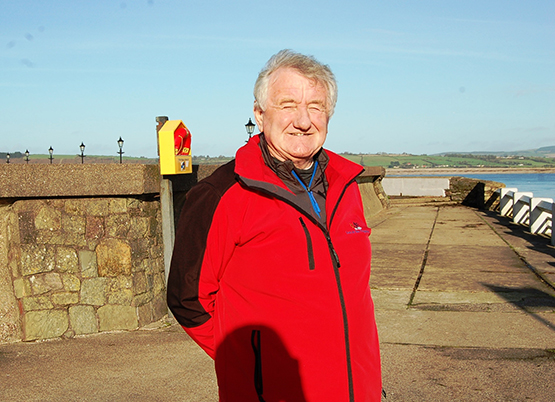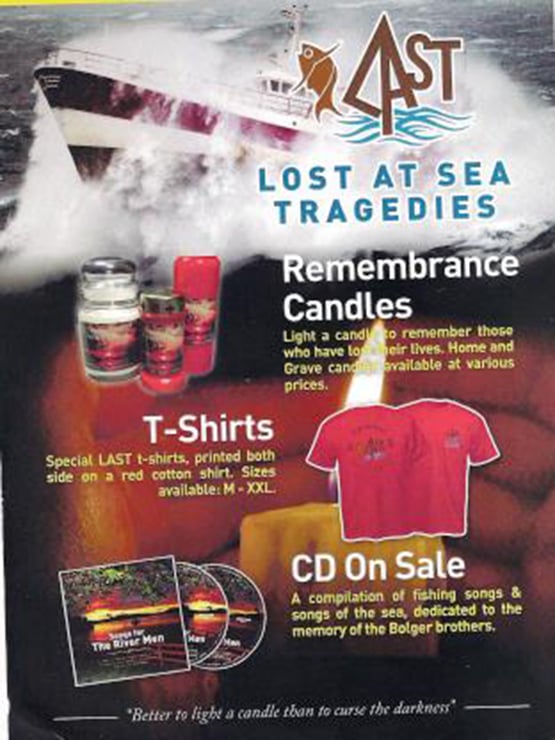Displaying items by tag: lost at sea
Remembering Lives Lost At Sea
I met a man this week who wants to make St.Stephen’s Day a national day of remembrance for those who have died in tragedies at sea.
There has never before been such a day in Ireland.
Noel McDonagh is from Dunmore East in County Waterford, one of the top fishing ports in the country where he spent many years of his life fishing.
He is the man who founded LAST – the charity called ‘Lost At Sea Tragedies’ – which has helped with financial aid to the families of fishermen who have lost members of their family in tragedies at sea.
 Noel McDonagh
Noel McDonagh
“I have seen many tragedies, friends, relatives lost at sea, something had to be done and I felt I would do it,” Noel tells me on the current edition of my THIS ISLAND NATION radio programme which you can hear here. I have done many interviews in my career on radio and television. This will stand out in my memory. Noel is dedicated to this cause in which he believes. Now retired, having been involved in the outdoor sports equipment business after fishing, when I met him he was delivering special candles made for LAST to shops for sale at Christmastime, to raise funds for the charity.
After the tragedy when the three Bolger brothers – Paul, Kenny and Shane - drowned while fishing on the Waterford coast in June of 2013, Noel was part of the group which organised and launched a CD called “Songs for the River Men.” Many artistes - from Ireland, the UK, USA, New Zealand, Australia, Canada and Newfoundland - contributed their work, to raise funds for the family.

Several coastal communities have arranged remembrance events for St.Stephen’s Day. “We are leaving it to communities to make their own arrangements. The remembrance will be for fishermen and all who have lost their lives at sea. Ireland should remember them and St.Stephen’s Day at Christmastime is a time to think of them and their families,” Noel said.
As well as helping families with financial aid when it is needed after a tragedy, LAST intends to “assist and educate the Irish fishing industry to help prevent future catastrophes while offering support and guidance to the families of those lost in fishing tragedies.”
“When there is a tragedy there is interest for a few weeks, amongst the media, the public, the State and then the tragedy can get forgotten. But LAST will not forget. Our aim is to create awareness about tragedies, the effects on families, on communities and how they should be avoided,” Noel McDonagh says. “LAST will achieve its aims by informing and influencing the Irish fishing industry, coastal communities, businesses, Governmental and non-governmental organisations in and around Ireland.”
Do please listen to his interview and also to Niamh Stephenson, Public Relations Manager with the RNLI, who recalls that last year, there were 100 call-outs of the lifeboats between Christmas and the New Year when 67 lives were saved. CEO of Irish Water Safety, John Leech, tells us about the national wards to those who have contributed to water safety and there is a beautiful story from Rhoda Twombly, Secretary of Comhdháil Oileán na hÉireann – the Islands’ Federation – about the difficulties of getting home to an offshore island with the Christmas supplies in bad weather.
On the programme I am also told how school pupils cleared 12 tonnes of rubbish from a beach wetlands area in East Cork where over 11,000 birds have been recorded. That debris included an entire camping tent, containing clothing, which had been buried on the beach.
As their teacher says: “Nothing about the way people disregard the importance of protecting our marine areas surprises me any longer!”
"Government Must Find Solution" to Donegal Family's Lost at Sea Compensation Case – Jim Higgins MEP
#lostatsea – "At today's European Parliament hearing into the Donegal 'Lost at Sea' case, it was declared that the Irish government must find a solution for the Byrne family who have yet to receive justice or compensation for the maladministration of the scheme", Jim Higgins MEP said in Brussels this afternoon
The Midlands North West MEP hosted Byrne family member Danny Byrne in bringing the Lost at Sea case to the European Parliament's Petitions Committee, requesting that the Irish government compensates the Donegal family, according to recommendations by the then Irish Ombudsman, Emily O' Reilly.
"The petition outlined the case of the Byrne family who sought but were wrongfully refused assistance from the Lost at Sea Scheme in 2001, after their father (Francis, 40), brother (Jimmy, 16) and three crew members were lost when their boat the Skifjord struck a reef off Burtonport and sank on October 31, 1981," Mr Higgins explained.
"In 2009, the then Ombudsman, Emily O'Reilly, published a scathing attack on the then Government's Lost at Sea Scheme. Among her findings she highlighted several oddities of the scheme - the fact that it only actively took in applications for six months, the selective advertisement of the scheme and that 75% of the compensation went to two constituents of Fianna Fáil's Frank Fahey TD - who created the scheme."
The Fine Gael MEP who has been seeking justice for the Byrne family since 2004 highlighted the Ombudsman's recommendation that €245,570 be granted to the Byrne family – compensation which is still outstanding.
"On reviewing the case today, the Petitions Committee unanimously agreed to officially request that the Irish government reviews the case in light of the Ombudsman's report and compensates the family. The Committee Chairman commented that the 'Irish government must find a solution' to the case and that is what we want – justice and compensation that is long overdue."
A European Commission spokesperson present at the hearing said the case could not qualify as an infringement of EU law as the Lost at Sea scheme had not been notified to the Commission at the time of its existence and no longer exists.
Mr Higgins added that it was an issue for the Irish government, stressing that he will continue to pursue the right to justice and compensation for the family with the national authorities and now with the added support of the European Parliament Committee.





























































